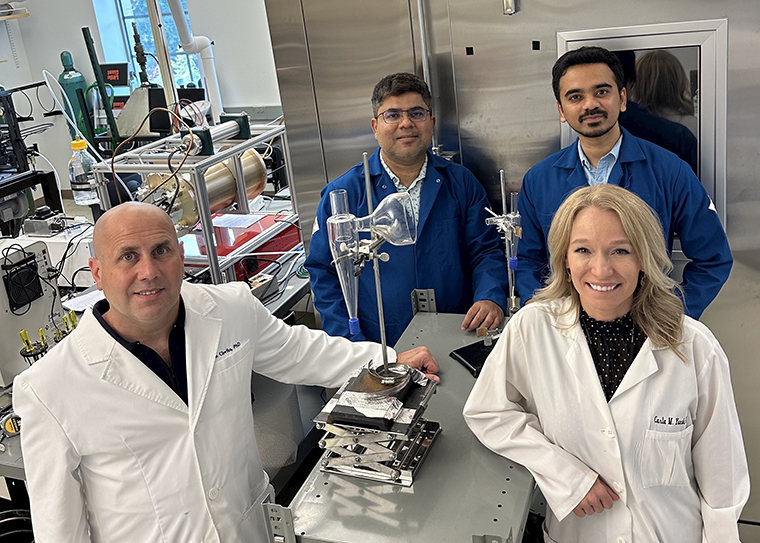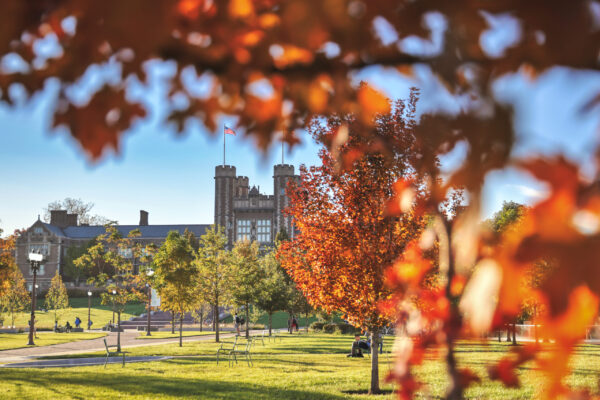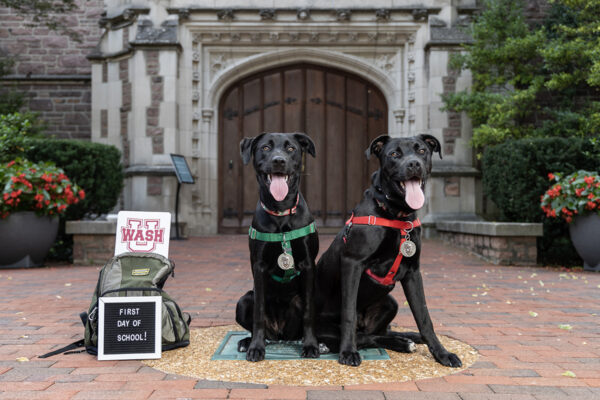In celebration of another year of discovery, community and excellence, the Record looks back at some of the most-read stories of 2023. Check back for future issues, when the Record highlights the year in photos and the year in video. We also check in with faculty members whose past research continued to reach new readers in 2023.
Expanding opportunities for students, staff

In 2023, Washington University in St. Louis adopted a “no-loan” financial aid policy, another big leap forward in its effort to be more accessible to students of all backgrounds. Starting with the incoming Class of 2028, all admitted students can obtain a world-class WashU education without going into debt. The new no-loan policy, which replaces federal loans with grants and scholarships, follows two other major financial aid initiatives — the shift to need-blind admissions and the WashU Pledge, which provides a free undergraduate education to students in Missouri and southern Illinois with annual family incomes of $75,000 or less. The university has received national recognition for its efforts, including recently being named #1 in the nation for financial aid by The Princeton Review.
WashU also announced the launch of the Taylor Family Center for Student Success, made possible by a $15 million gift from Andrew Taylor, a WashU emeritus trustee, and his wife, Barbara. The Taylor Family Center creates new opportunities for first-generation and limited-income undergraduate students to connect with mentors, strengthen social and professional networks, explore purpose-driven internships and develop financial literacy.
The university also has expanded opportunities for employees. The Live Near Your Work program now provides $12,500 in forgivable home loans — an increase of $4,000 — to employees who buy homes in neighborhoods that have faced historic disinvestment. And the pre-nursing program at the School of Continuing & Professional Studies continues to prepare School of Medicine employees and other working adults for high-demand, high-paying nursing jobs. The program is flexible, feasible and for most university employees, free.
Advancing human health

WashU scientists made important discoveries that will save lives. McKelvey School of Engineering and School of Medicine researchers created a real-time monitor that can detect any of the SARS-CoV-2 virus variants in a room in about five minutes. The inexpensive, proof-of-concept device could be used in hospitals, schools and public places to help detect CoV-2 and potentially monitor for other respiratory virus aerosols. Chenyang Lu, the Fullgraf Professor at McKelvey Engineering and a professor of medicine at the School of Medicine, and a team of researchers developed a deep-learning model called WearNet, which uses Fitbit data and deep learning to detect depression and anxiety. And at the School of Medicine, Evan M. Gordon, an assistant professor of radiology, and Nico Dosenbach, MD, PhD, an associate professor of neurology, found that parts of the brain area that control movement are plugged into networks involved in thinking and planning and in control of involuntary bodily functions such as blood pressure and heartbeat. The findings represent a literal linkage of body and mind in the very structure of the brain. The School of Medicine also produced important research that identified four important signs and symptoms that signal an elevated risk of early-onset colorectal cancer. These red flags — abdominal pain, rectal bleeding, diarrhea and iron deficiency anemia — may be key to earlier detection and diagnosis of early-onset colorectal cancer among younger adults.
Brookie, Bear, boba and basswood

The Danforth Campus welcomed some great new additions in 2024. Brookie and Bear, the Washington University Police Department comfort dogs, immediately won the hearts of students, staff and faculty. Abandoned as puppies, Brookie and Bear have been trained to offer support to students who may be experiencing a crisis or just need a cuddle after a hard day. Almost as popular: the new boba tea options at Corner 17 in Whispers Cafe, one of four new minority- or woman-owned campus eateries that opened this academic year. And then there was the planting of a clone of the iconic American basswood that had shaded Brookings Quadrangle for more than 100 years until it was felled by lightning. The new tree added to the university’s collection of nearly 6,000 trees.
New discoveries about human behavior

WashU faculty answered interesting questions about why we act the way we do. A study by Joshua Jackson, the Saul and Louise Rosenzweig Associate Professor in Personality Sciences in Arts & Sciences, found how parents’ personalities — boisterous or reserved, agreeable or cranky, concerned or care-free — can significantly affect their child’s health, grades and more. Research on “quiet quitting” by Yongseok Shin, the Douglass C. North Distinguished Professor in Economics in Arts & Sciences, revealed that college-educated males who worked roughly 50 hours a week were most likely to scale back their hours during the pandemic. Alison B. Tuck, a PhD candidate in clinical psychology in Arts & Sciences, created the Social Media Use Scale, which breaks down how we use social media into four broad categories — belief-based, consumption-based, image-based and comparison-based. Each category is uniquely related to specific personality and behavioral traits. And Calvin Lai, an associate professor of psychological and brain sciences in Arts & Sciences, published a study suggesting that the daylong implicit bias-oriented training programs now common in U.S. police departments produce an understanding of bias but are less effective at changing behavior.
A community of changemakers

This year, WashU celebrated many students, faculty and staff who are making an impact at WashU. One of them was the Rev. Gary Braun, who served as spiritual leader of the Catholic Student Center for 33 years.
“This is a safe space for students in a million ways and for many, many things, including their faith. Students don’t have to go through any dogma or purity tests to be accepted here — like for Jesus in his day,” Braun told Washington Magazine.
Tori Harwell, a senior and Ervin Scholar, became the 30th WashU student to be selected as a Rhodes Scholar. Harwell plans to pursue sequential degrees in nature, society and environmental governance and in African studies at Oxford University.
In May, WashU marked the graduation of 3,500 students, including many who decided to stay in St. Louis to make the region healthier and stronger. One of those students was School of Medicine graduate Alexandra Zdonczyk, one of the 12 students profiled for WashU’s annual Class Acts feature.
“I feel at home in St. Louis,” said Zdonczyk, who is a resident at Barnes-Jewish Hospital. “Here, I feel like I can make a positive impact on people’s lives.”
In the fall, WashU also welcomed 1,834 new first-year students from 50 states and 29 countries. The most diverse class in WashU history, 21% of students are Pell Grant-eligible; 17% are the first in their families to attend college; 53% identify as students of color.
“We’re taking in all of you, with your diverse perspectives, identities and experiences,” Provost Beverly Wendland told the Class of 2027 at Convocation. “You, our students, are an important part of this community — you contribute to our overall health and happiness as a community. It’s you, our students, that help us to thrive.”


